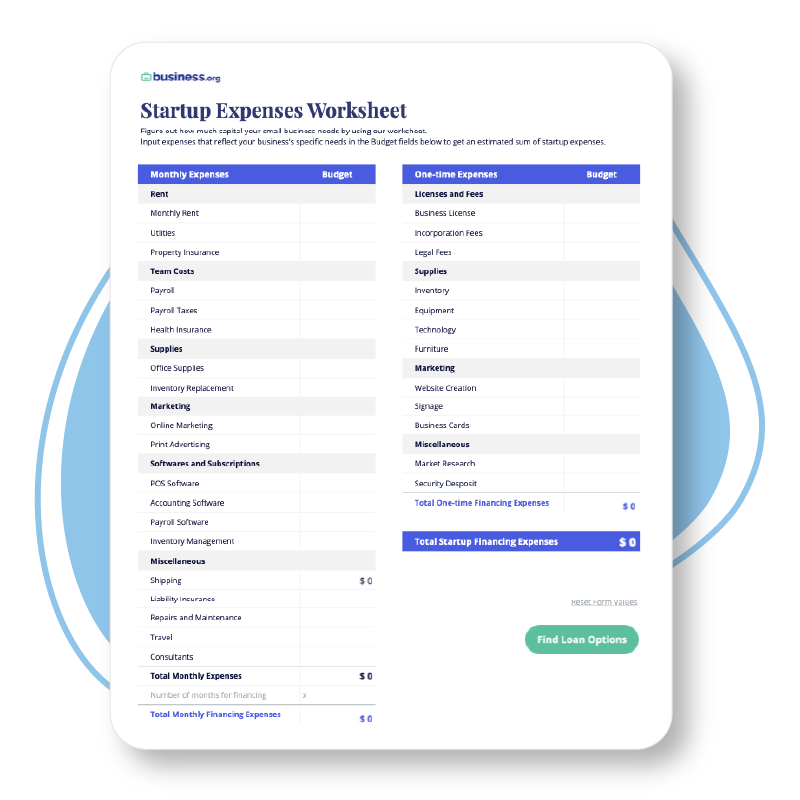We are committed to sharing unbiased reviews. Some of the links on our site are from our partners who compensate us. Read our editorial guidelines and advertising disclosure.
Flour Power: How to Start a Bakery from Scratch in 11 Steps
If you love to bake, starting your own bakery may sound like a dream come true. But what does it really take to turn your passion into a profitable business?
Before you break out the dough and sprinkles, there are several steps you need to take to ensure your bakery's success.
We'll break down how to start a bakery, from creating a business plan to obtaining permits and marketing your business.
By signing up I agree to the Terms of Use and Privacy Policy.
How to start a bakery business in 11 steps
Whether it's a small operation in a home kitchen or a large storefront with multiple employees, there’s a lot of work that goes into launching a successful bakery.
Here’s what you need to know.
1. Choose a bakery business type
One of the first decisions you’ll need to make is the type of bakery business you want to operate.
Here are some of the most common types of retail bakeries.
Counter service bakery
This type of bakery is small and efficient. Most counter-style bakeries don’t have a dining space. Instead, customers browse baked goods in the display case and order what they want from the counter.
Bakery cafe
Bakery cafes combine counter-service with a dining area where your customers can sit and enjoy their food. You can offer drinks, like tea and coffee, to pair with your baked goods.
Specialty bakery
A specialty bakery focuses on a specific type of baked goods, such as bagels, cupcakes, artisan breads or wedding cakes. While you can offer other items, most of your business will come from a specific niche.
Food truck
Food truck bakeries have exploded in popularity in recent years - and for good reason. Making your bakery mobile can help you reach customers in different locations, such as fairs, festivals and corporate events.
You’ll likely need to make your baked goods at home or in a commercial kitchen before loading them in your food truck and hitting the road.
Home bakery
If you want to start small, you can cook up a bakery business at home. You can sell your baked goods directly to customers through your website, or at pop-up events and farmers' markets. You can ship your orders or arrange for local pick up and delivery.
Need to build a website? Check out our top picks
Data as of 5/3/23. Offers and availability may vary by location and are subject to change.
*With annual billing.
2. Create a bakery business plan
Before you can start a bakery, you need to draw up a clear plan for your business.
A business plan outlines your bakery's goals, target market, products, pricing, marketing strategy and financial projections. It serves as a roadmap for your new venture. A business plan is also required if you apply for a business loan.
Here are the basic parts of a bakery business plan.
- Executive summary: This section provides a brief overview of the bakery, including its name, location, products and unique selling proposition.
- Market analysis: Look at your competitors' prices, products and target audience to identify gaps in the market that your bakery can fill.
- Product and services: Describe the baked goods you'll offer and what sets your bakery apart from others in the area. It could be your signature cupcakes, gluten-free options or vegan treats.
- Marketing and sales plan: This section details how you plan to advertise your bakery, grow your sales and reach customers.
- Financial plan and projections: Determine the startup costs, including equipment, rent, ingredients and any employee wages. Then, estimate your bakery's revenue based on your pricing strategy and sales projections. This information will help you determine how much funding you'll need to start your bakery and how long it will take to break even.
For easier financial reporting, try accounting software
Data as of 5/3/23. Offers and availability may vary by location and are subject to change.
*Only available for businesses with an annual revenue beneath $50K USD
**Current offer: 50% off for 3 mos. or 30-day free trial
†Current offer: 50% off for three months or 30-day free trial
‡Current offer: 75% off for 3 mos. Available for new customers only
3. Pick a business entity
Next, you’ll need to choose a legal structure for your bakery business. There are several options, and some are more complicated than others.
- Sole proprietorship: This is the simplest and most common structure for small businesses. It makes you the sole owner of your bakery, and gives you complete control over business decisions. However, it also means that you are personally liable for the business' debts and legal issues.
- Partnership: A partnership is owned by two or more people, and each partner is responsible for the business' debts and liabilities.
- Limited liability corporation: An LLC is a hybrid entity that combines the liability protection of a corporation with the tax benefits of a partnership.
- Corporation: A corporation is a separate legal entity that is owned by shareholders, and it provides the most liability protection for owners. It also comes with more paperwork and fees.
The type of business entity you choose will impact your taxes and legal responsibilities — so it’s a big decision. If you’re not sure which entity to choose, consult with a business attorney or financial advisor.
4. Choose a location
Picking the right location for your business is essential.
If you’re opting for a retail bakery with a storefront, your location should be easily accessible and have adequate parking.
The cost of rent, utilities and property taxes must also be considered when choosing a location. A high-end boutique space in downtown might attract more foot traffic, but it will come with higher overhead costs.
To save money on equipment, look for a location that was recently occupied by another bakery. They may have the large ovens, refrigerators or freezers you need to run your new business.
Enlisting the help of an experienced commercial real estate agent who’s familiar with the community can make your search for a brick-and-mortar location much easier.
Starting a home bakery business is another option. Home bakeries can be a cost-effective way to test the market before expanding to a commercial location.
There are state laws governing home-based food businesses, so it’s important to research and comply with any regulations in your area.
Finally, if you’re opting for a food truck bakery business, look at car dealerships that sell food trucks. You can also check places like Craigslist and Facebook Marketplace to find deals on used food trucks.
5. Secure appropriate permits and licensing
Each state requires its own permits and licensing to operate a food business. You’ll need to research the rules and regulations in your specific state, county and city to ensure you're in compliance.
Google “retail kitchen laws for (name of state)” to find regulations for your area. Then outline all the paperwork you’ll need to complete, making note of deadlines and fees.
Get this process started early. It can take weeks or even months to get all the paperwork processed.
Some common permits and licenses you may need include:
- Food handler’s license
- Catering license
- Health and safety inspection
- Sales license
- Zoning permits
To get your licenses and permits, you’ll need to fill out applications and provide documentation, such as proof of insurance, a business plan, or a lease or rental agreement for your bakery space.
You may also need to pass inspections from the health department and the fire department.
6. Prepare for taxes
As a business owner, you’ll need to pay a host of new taxes, including federal taxes, sales taxes and payroll taxes.
Consulting with an accountant is a smart move. A tax professional can advise you on how to structure your business to minimize your tax bill, as well as help you prepare and file your tax returns.
Make sure to keep accurate records of your income and expenses, as well as any tax payments you make. You’ll need this documentation if you get audited or fail to pay your taxes on time.
You’ll also need an employer identification number (EIN), a unique identifier assigned by the Internal Revenue Service. It’s required for all types of business entities, except for sole proprietorships that don't have employees.
To obtain an EIN, you must apply online through the IRS website. It’s free to apply and the EIN is usually issued immediately.
Best small business tax software
Data as of 1/11/23. Offers and availability may vary by location and are subject to change.
Pro tip: Taxes can be complicated. Here’s everything you need to know about how to file small business taxes.
7. Open a business account
You may be required by law to open a separate business bank account for tax purposes, depending on which state you live in. Many banks and credit unions offer business checking and savings accounts.
Separating your personal and business finances also makes it easier to track where your money is going.
You may want to consider opening a small business credit card, too. A business credit card can help you separate your personal and business expenses while also earning cash back and rewards.
Top banks for small businesses
Data effective 4/20/23. At publishing time, rates, fees, and requirements are current but are subject to change. Offers may not be available in all areas.
Pro tip: Need to pay for start-up costs? Here are the best high-limit business credit cards.
8. Secure business funding
It can cost anywhere from $10,000 to $50,000 to start a bakery, according to Entrepreneur.
That’s a lot of money. New business owners will likely need to secure some funding from outside sources to get up and running.
Here are a few ways to fund your small business. Keep in mind that a lending marketplace or fintech company, like Nav, may offer a few of these options.
Business line of credit
A business line of credit works similarly to a credit card, where the borrower is approved for a maximum amount of credit that they can draw upon as needed.
Interest rates for business lines of credit are typically higher than those for commercial loans, but they can be a good option for businesses that need quick access to cash.
Pro tip: Want to explore your options? Here are the best business lines of credit for small businesses.
Small business microloans
The Small Business Administration (SBA) offers microloans worth up to $50,000 to help small businesses start and expand. These loans are offered through intermediary lenders. They generally require some kind of collateral and cannot be used to pay existing debts or to purchase real estate.
Traditional commercial loans
These loans — which are available at banks and other financial institutions — typically have strict eligibility requirements. The approval process can be lengthy and time-consuming. Commercial loans often require collateral, such as a home or car. You also usually need a high credit score and a history of successful business operations to get approved.
Crowdfunding
Crowdfunding platforms like Kickstarter let you showcase your business idea and solicit donations from people who are interested in supporting your venture. You can’t rely on crowdfunding sites for on-going expenses, but it’s one way to raise startup capital.
Once you've got your finances in order, you can start purchasing equipment and marketing your bakery.
Pro tip: About 75% of small businesses get turned down for loans by big banks. Here’s a list of the best alternative business loans from online lenders.
9. Develop your menu
Figuring out what to sell, how to price things and arranging everything on a page is no small task.
First, write down all your ideas and potential baked goods before organizing them into groups based on ingredients and equipment.
Next:
- Identify your signature items. What do you want to be known for? Spotlight these baked goods on your menu.
- Research trends. Research current trends in baking (anything from organic dog treats to unicorn cakes) and incorporate a few into your menu.
- Price your items. Consider the cost of ingredients, labor and overhead when pricing your items. A standard rule of thumb for pricing is to triple your expenses for the item, then adjust for market pricing.
Before you open, call local vendors to price their products and order supplies. This will help you determine how much to charge for your treats.
10. Purchase bakery equipment and supplies
To turn a baking hobby into a baking business, you’ll need to invest in some industrial equipment and supplies.
This can include ovens, mixers, baking sheets, refrigerators, display cases, and more.
You can purchase new or used bakery equipment, depending on your budget. If money is tight, you might consider leasing your equipment. This gives you access to the equipment you need for a set period of time, though you won’t own it once the lease expires.
Compare the best POS systems plans and pricing
Data as of 3/9/23. Offers and availability may vary by location and are subject to change.
*Free trial for the first 14 days
11. Create your bakery’s branding and marketing strategy
Now is the time for your passion to shine. What makes your bakery unique?
You probably already have a name picked out for your bakery. But your brand identity should also include a logo, color scheme, typography and packaging that communicates your bakery’s personality.
If you haven’t done so, you’ll need to create a website and social media accounts for your business. After all, social media marketing is a free and effective way to attract new customers.
It’s best to pick a social media platform that you’re already familiar with when starting out, preferably one where you have a following.
Posting high-quality pictures of your treats is sure to attract attention. (If you need to brush up on your photography skills, there are lots of online videos on how to take professional-looking food photos.)
Make sure to keep your branding and messaging consistent across all marketing channels, including the bakery’s website, social media channels and signage.
Starting a bakery isn’t easy. But if you’ve made it this far — congratulations! With the right plan in place, you’ll be raking in the dough in no time.
Rachel Christian is a Certified Educator in Personal Finance and a senior writer at The Penny Hoarder. She focuses on retirement, small businesses, investing and taxes.

Customize your website with an easy-to-use site builder that’ll make your brand look professional and polished in no time.




















